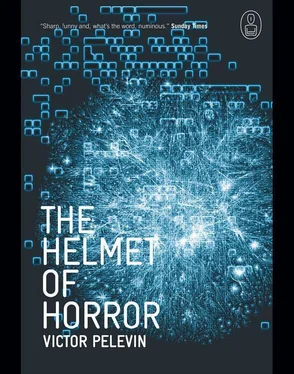Victor Pelevin - Helmet of Horror
Здесь есть возможность читать онлайн «Victor Pelevin - Helmet of Horror» весь текст электронной книги совершенно бесплатно (целиком полную версию без сокращений). В некоторых случаях можно слушать аудио, скачать через торрент в формате fb2 и присутствует краткое содержание. Жанр: Книги. Описание произведения, (предисловие) а так же отзывы посетителей доступны на портале библиотеки ЛибКат.
- Название:Helmet of Horror
- Автор:
- Жанр:
- Год:неизвестен
- ISBN:нет данных
- Рейтинг книги:4 / 5. Голосов: 2
-
Избранное:Добавить в избранное
- Отзывы:
-
Ваша оценка:
- 80
- 1
- 2
- 3
- 4
- 5
Helmet of Horror: краткое содержание, описание и аннотация
Предлагаем к чтению аннотацию, описание, краткое содержание или предисловие (зависит от того, что написал сам автор книги «Helmet of Horror»). Если вы не нашли необходимую информацию о книге — напишите в комментариях, мы постараемся отыскать её.
Helmet of Horror — читать онлайн бесплатно полную книгу (весь текст) целиком
Ниже представлен текст книги, разбитый по страницам. Система сохранения места последней прочитанной страницы, позволяет с удобством читать онлайн бесплатно книгу «Helmet of Horror», без необходимости каждый раз заново искать на чём Вы остановились. Поставьте закладку, и сможете в любой момент перейти на страницу, на которой закончили чтение.
Интервал:
Закладка:


THE HELMET OF
HORROR
The Myth of Theseus and the Minotaur
Victor Pelevin
Translated from the Russian by
Andrew Bromfield

Contents
Title PageMythcellaneous
Started By Ariadne At xxx P.M. xxx xxx Bc Gmt
About the Author
Also By Victor Pelevin
Copyright
Mythcellaneous‘No one realised that the book and the labyrinth were one and the same …’
Borges, The Garden of Forking Paths
According to one definition, a myth is a traditional story, usually explaining some natural or social phenomenon. According to another, it is a widely held but false belief or idea. This duality of meaning is revealing. It shows that we naturally consider stories and explanations that come from the past to be untrue – or at least we treat them with suspicion. This attitude, apart from creating new jobs in the field of intellectual journalism, gives some additional meaning to our life. The past is a quagmire of mistakes; we are here to find the truth. We know better.
The road away from myth is called ‘progress’. It is not just scientific, technical or political evolution. Progress has a spiritual constituent beautifully expressed by F. Scott Fitzgerald in The Great Gatsby :[a belief] in the green light, the orgastic future that year by year recedes before us. It eluded us then, but that’s no matter – tomorrow we will run faster, stretch our arms further … And one fine morning –So we beat on, boats against the current, borne back ceaselessly into the past.
In other words, progress is a propulsion technique where we have to constantly push ourselves away from the point we occupied a moment ago. However, this doesn’t mean that we live without myths now. It only means that we live with instant myths of soap-bubble content. They are so unreal you can’t even call them lies. Anything can become our mythology for fifteen minutes, even Mythbusters programme on the Discovery channel.
The foundation of this mind-set on progress is not faith, as happens with traditional cults, but the absence of it. However, the funny thing is that the concept of progress has been around for so long that now it has all the qualities of a myth. It is a traditional story that pretends to explain all natural and social phenomena. It is also a belief that is widespread and false.
Progress has brought us into these variously shaped and sized cubicles with glowing screens. But if we start to analyse this high-end glow in terms of content and structure, we will sooner or later recognise the starting point of the journey – the original myth. It might have acquired a new form, but it hasn’t changed in essence. We can argue about whether we were ceaselessly borne back into the past or relentlessly pushed forward into the future, but in fact we never moved anywhere at all.
And even this recognition is a traditional story now. A long time ago Jorge Luis Borges wrote that there are only four stories that are told and re-told: the siege of the city, the return home, the quest, and the (self-) sacrifice of God. It is notable that the same story could be placed into different categories by different viewers: what is a quest/return home for Theseus is a brutal God’s sacrifice for Minotaur. Maybe there are more than just ‘four cycles’, as Borges called them, but their number is definitely finite and they are all known. We will invent nothing new. Why?
This is where we come to the third possible definition of a myth. If a mind is like a computer, perhaps myths are its shell programs: sets of rules that we follow in our world processing, mental matrices we project onto complex events to endow them with meaning. People who work in computer programming say that to write code you have to be young. It seems that the same rule applies to the cultural code. Our programs were written when the human race was young – at a stage so remote and obscure that we don’t understand the programming language any more. Or, even worse, we understand it in so many different ways and on so many levels that the question ‘what does it mean?’ simply loses sense.
Why does the Minotaur have a bull’s head? What does he think and how? Is his mind a function of his body or is his body an image in his mind? Is Theseus inside the Labyrinth? Or is the Labyrinth inside Theseus? Both? Neither?
Each answer means that you turn down a different corridor. There were many people who claimed they knew the truth. But so far nobody has returned from the Labyrinth. Have a nice walk. And if you happen to meet the Minotaur, never say ‘MOOO’. It is considered highly offensive.
Started by ARIADNE at xxx p.m. xxx xxx BC GMT
I shall construct a labyrinth in which I can lose myself, together with anyone who tries to find me – who said this and about what?
:-)
Organizm(-:
What’s going on? Is there anyone there …?
Romeo-y-Cohiba
I’m here.
Organizm(-:
So what’s going on round here?
Romeo-y-Cohiba
Your guess is as good as mine.
Organizm(-:
Ariadne, are you there?
Romeo-y-Cohiba
Who’s she?
Organizm(-:
She started this thread. Seems this isn’t the Internet, just looks like it. You can’t link to anywhere else from here.
Romeo-y-Cohiba
xxx
Organizm(-:
Hello! If anyone can read this, please answer.
Nutscracker
I can read it.
Organizm(-:
Who posted the first message?
Nutscracker
It’s been up on the board a long time.
Romeo-y-Cohiba
How can you tell? There’s no date on it.
Nutscracker
I saw it three hours ago.
Organizm(-:
Attention, roll-call. There’s just Nutcracker, Romeo and me here, is that right?
Romeo-y-Cohiba
That’s right.
Nutscracker
At least, we’re the only ones who want to join in.
Romeo-y-Cohiba
Right, so there are three of us here.
Nutscracker
But where is here exactly?
Organizm(-:
How do you mean?
Nutscracker
Quite literally. Can you describe where you are now? What is it – a room, a hall, a house? A hole in someone’s xxx?
Romeo-y-Cohiba
Well I’m in a room, anyway. Or a cell, I can’t tell which is more correct. Not very big. Green walls, white ceiling lamp. A bed by one wall and by the opposite wall a desk with the keyboard I’m typing on right now. The keyboard is attached rigidly to the desk. Above the desk there’s an LCD screen set in the wall behind thick glass. That’s where all these letters appear. It’s impossible to break, I tried already. The room has two doors, one made of strange, blackish-green metal. It’s locked. There’s a raised section in the middle of it. The other door’s made of wood, painted white, and it leads into a bathroom. It’s open.
Organizm(-:
I’ve got the same as Romeo. A locked metal door with some kind of relief design on it. A hotel-style bathroom with soap, shower gel and shampoo on the shelf under the mirror. Everything in packaging marked with a strange symbol – something like a little cogwheel. So where are you, Nutcracker?
Читать дальшеИнтервал:
Закладка:
Похожие книги на «Helmet of Horror»
Представляем Вашему вниманию похожие книги на «Helmet of Horror» списком для выбора. Мы отобрали схожую по названию и смыслу литературу в надежде предоставить читателям больше вариантов отыскать новые, интересные, ещё непрочитанные произведения.
Обсуждение, отзывы о книге «Helmet of Horror» и просто собственные мнения читателей. Оставьте ваши комментарии, напишите, что Вы думаете о произведении, его смысле или главных героях. Укажите что конкретно понравилось, а что нет, и почему Вы так считаете.









